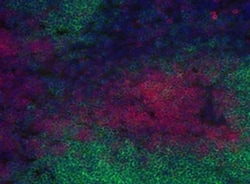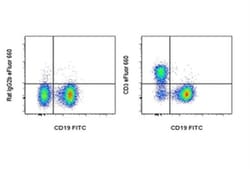Learn More
Invitrogen™ CD3 Monoclonal Antibody (17A2), eFluor™ 660, eBioscience™, Invitrogen™

Description
Description: The 17A2 monoclonal antibody reacts with the mouse CD3 complex. CD3 subunits gamma, delta and epsilon are required for proper assembly, trafficking and surface expression of the TCR complex. CD3 is expressed by thymocytes in a developmentally regulated manner and by all mature T cells. Binding of 17A2 to CD3 initiates the intracellular biochemical pathway resulting in cellular activation and proliferation. Applications Reported: This 17A2 antibody has been reported for use in flow cytometric analysis, and immunohistochemical staining of frozen tissue sections. Applications Tested: This 17A2 antibody has been tested by flow cytometric analysis of mouse splenocytes. This can be used at less than or equal to 0.25 μg per test. A test is defined as the amount (μg) of antibody that will stain a cell sample in a final volume of 100 μL. Cell number should be determined empirically but can range from 10^5 to 10^8 cells/test. This 17A2 antibody has also been testedy by immunohistochemistry on frozen mouse spleen and can be used at less than or equal to 10 μg/mL. It is recommended that the antibody be carefully titrated for optimal performance in the assay of interest. eFluor™ 660 is a replacement for Alexa Fluor™ 647. eFluor™ 660 emits at 659 nm and is excited with the red laser (633 nm). Please make sure that your instrument is capable of detecting this fluorochome.

Specifications
Specifications
| Antigen | CD3 |
| Applications | Flow Cytometry, Immunohistochemistry (Frozen), Immunocytochemistry |
| Classification | Monoclonal |
| Clone | 17A2 |
| Concentration | 0.2 mg/mL |
| Conjugate | eFluor 660 |
| Formulation | PBS with 0.09% sodium azide; pH 7.2 |
| Gene | Cd3d |
| Gene Accession No. | P04235, P11942, P22646, P24161 |
| Gene Alias | 4930549J05Rik; A430104F18Rik; AI504783; antigen CD3D, delta polypeptide (TiT3 complex); antigen CD3E, epsilon polypeptide (TiT3 complex); antigen CD3G, gamma polypeptide; antigen CD3Z, zeta polypeptide; AW552088; Cd247; CD247 antigen; CD247 antigen, zeta subunit; Cd247 molecule; CD3; CD3 antigen delta chain; CD3 antigen delta polypeptide; CD3 antigen gamma chain; CD3 antigen, delta polypeptide; CD3 antigen, delta subunit; CD3 antigen, epsilon polypeptide; CD3 antigen, gamma polypeptide; CD3 antigen, zeta polypeptide; CD3 delta; CD3 epsilon; CD3 epsilon chain; CD3 epsilon subunit; CD3 epsilon subunit precursor; CD3 gamma-chain; CD3 glycoprotein; CD3 glycoprotein precursor; CD3 molecule delta polypeptide; CD3 molecule, delta; CD3 molecule, epsilon; CD3 molecule, epsilon polypeptide; CD3 molecule, gamma; CD3 molecule, gamma polypeptide; CD3 protein; CD3 TCR complex; CD3 type I transmembrane glycoprotein; CD3 type I transmembrane glycoprotein precursor; CD3 zeta chain; Cd3d; CD3D antigen delta; CD3D antigen, delta polypeptide (TiT3 complex); CD3d molecule; CD3d molecule, delta (CD3-TCR complex); CD3-DELTA; Cd3e; CD3E antigen, epsilon polypeptide; CD3E antigen, epsilon polypeptide (TiT3 complex); CD3e molecule; CD3e molecule, epsilon (CD3-TCR complex); CD3epsilon; CD3-epsilon; Cd3-eta; Cd3g; CD3G antigen, gamma polypeptide; CD3g antigen, gamma polypeptide (TiT3 complex); CD3g molecule; CD3g molecule, epsilon (CD3-TCR complex); CD3g molecule, gamma (CD3-TCR complex); CD3-GAMMA; Cd3h; CD3Q; Cd3z; CD3Z antigen, zeta polypeptide (TiT3 complex); Cd3zeta; Cd3-zeta; CD3zeta chain; CD3-zeta/eta; Ctg3; Ctg-3; FLJ18683; IMD17; IMD18; IMD19; IMD25; Leu-4; OKT3, delta chain; T cell antigen receptor complex epsilon subunit of T3; T3/TCR complex; T3d; T3e; T3g; T3Z; T-cell antigen receptor complex, epsilon subunit of T3; T-cell antigen receptor complex, gamma subunit of T3; T-cell antigen receptor complex, zeta subunit of CD3; T-cell receptor CD3 epsilon chain; T-cell receptor CD3 epsilon subunit; T-cell receptor CD3 subunit zeta; T-cell receptor CD3, subunit zeta; T-cell receptor T3 delta chain; T-cell receptor T3 eta chain; T-cell receptor T3 gamma chain; T-cell receptor T3 zeta chain; T-cell receptor zeta chain; T-cell surface antigen T3/Leu-4 epsilon chain; T-cell surface glycoprotein CD3 delta chain; T-cell surface glycoprotein CD3 epsilon chain; T-cell surface glycoprotein CD3 gamma chain; T-cell surface glycoprotein CD3 zeta chain; T-cell surface protein; TcR CD3 delta-chain; TcR CD3 gamma-chain; TCR zeta chain; TCR zeta chain subunit; TCRE; Tcrk; TCRZ; TCRzeta; TiT3 complex; type I transmembrane protein; T-cell surface molecule CD3 |
| Show More |
For Research Use Only.
By clicking Submit, you acknowledge that you may be contacted by Fisher Scientific in regards to the feedback you have provided in this form. We will not share your information for any other purposes. All contact information provided shall also be maintained in accordance with our Privacy Policy.




